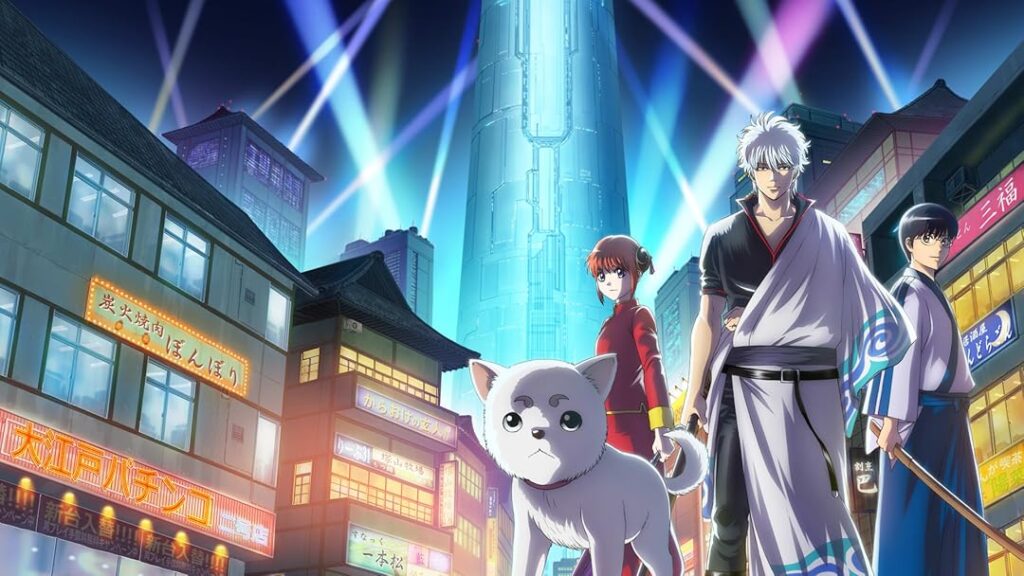soundcontrolstudio.com – Gintama (銀魂), adapted from Hideaki Sorachi’s manga, is a long-running anime series that defies easy categorization. It’s a riotous blend of samurai action, science fiction, historical fiction, slapstick comedy, and poignant drama, all wrapped in a self-aware and often fourth-wall-breaking package. Set in an alternate Edo-era Japan that has been invaded by aliens known as Amanto, Gintama offers a unique and consistently entertaining viewing experience.
The Odd Jobs Trio: A Group of Lovable Misfits
The story primarily follows the Odd Jobs Gin, a freelance service run by three unlikely companions:
- Gintoki Sakata: A lazy, sweet-toothed samurai with a dry wit and a surprisingly strong sense of justice. He’s the heart of the Odd Jobs trio, despite his often irresponsible behavior.
- Shinpachi Shimura: A bespectacled teenager who joins Odd Jobs Gin after being saved by Gintoki. He acts as the straight man to Gintoki’s antics and often provides narration.
- Kagura: A powerful Amanto girl with superhuman strength and an insatiable appetite. She adds a dose of chaotic energy to the group.
A Dysfunctional Family: The Odd Jobs trio functions as a dysfunctional but loving family, supporting each other through thick and thin.
Relatable Characters: Despite their extraordinary circumstances, the characters of Gintama are relatable due to their human flaws and struggles.
Edo in the Amanto Era: A Blend of Past and Future
Gintama is set in an alternate Edo-era Japan that has been heavily influenced by the Amanto invasion. The city of Edo (now called Kabuki-cho) is a vibrant mix of traditional Japanese architecture and futuristic technology.
Anachronisms and Cultural Mashups: The series embraces anachronisms and cultural mashups, combining samurai culture with elements of science fiction, pop culture, and modern Japanese society.
Social Commentary: Through its depiction of the Amanto invasion and its aftermath, Gintama offers subtle social commentary on themes of cultural change, power dynamics, and the impact of foreign influence.
Episodic Adventures and Overarching Story Arcs
Gintama features a mix of episodic adventures and longer story arcs. The episodic format allows for a wide variety of comedic and self-contained stories, while the overarching arcs delve into more serious themes and develop the characters and their relationships.
Variety of Humor: The series employs a wide range of comedic styles, including slapstick, satire, parody, and fourth-wall breaks.
Emotional Depth: While known for its humor, Gintama also explores deeper emotional themes, including loss, grief, friendship, and the importance of protecting what you care about.
The Joui War and Gintoki’s Past: A Darker Undercurrent
Beneath the comedic surface lies a darker undercurrent related to the Joui War, a conflict fought between the samurai and the Amanto. Gintoki, along with other key characters, is a veteran of this war, and his past experiences continue to haunt him.
Exploration of Trauma: The series explores the lasting impact of war and trauma on individuals and society.
Character Backstories: The backstories of Gintoki and other characters provide context for their present actions and motivations.
Themes of Friendship, Loyalty, and the Importance of Living True to Yourself
Gintama explores several important themes:
The Power of Friendship: The bond between the Odd Jobs trio and their various allies is a central theme, highlighting the importance of friendship and support.
The Value of Loyalty: The series emphasizes the importance of loyalty to one’s friends and beliefs.
Living True to Yourself: The characters of Gintama often struggle with finding their place in the world and living true to themselves, despite societal pressures.
A Metafictional and Self-Aware Masterpiece
Gintama is known for its metafictional elements and its frequent breaking of the fourth wall. The characters often acknowledge their own fictional nature and make references to other anime and manga.
Parody and Satire: The series frequently parodies and satirizes other anime, manga, and pop culture phenomena.
Direct Address to the Audience: The characters often directly address the audience, creating a sense of connection and intimacy.
A Long-Running and Beloved Series
Gintama is a long-running and beloved series that has garnered a dedicated fanbase. Its unique blend of humor, action, and heart has made it a standout in the anime world.
Consistent Entertainment: The series consistently delivers high-quality entertainment, balancing its comedic and dramatic elements effectively.
A Cultural Phenomenon: Gintama has become a cultural phenomenon in Japan and around the world, known for its memorable characters, its unique style, and its lasting impact on the anime landscape.
